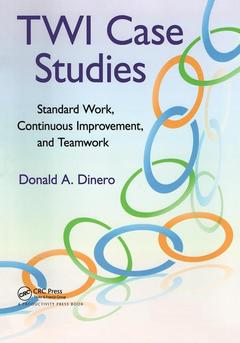Description
TWI Case Studies
Standard Work, Continuous Improvement, and Teamwork
Author: Dinero Donald A.
Language: English
Subjects for TWI Case Studies:
Keywords
IBM System; Pay For Performance; Training Within Industry program; IBM Employee; teamwork; Sinusoidal Wave Shape; continuous improvement plan; TWI Program; management support; Green Mountain Coffee Roasters; Computing Tabulating Recording Company; Job Instruction Training; TWI Training; Job Methods Training; Job Relations Training; Rhino Foods; JBS; Standardized Work Documentation; Standard Work Instructions; Kaizen Institute; Herman Miller; Job Instruction Skill; Work Team Leader; Hr Generalist; In-house Trainers; Job Instruction; Takt Time; Albans Plant; Office Furniture Industry
Publication date: 12-2020
· 17.8x25.4 cm · Hardback
Publication date: 04-2011
108 p. · 17.8x25.4 cm · Paperback
Description
/li>Contents
/li>Readership
/li>Biography
/li>
TWI Case Studies: Standard Work, Continuous Improvement, and Teamwork provides the insight of leading experts to assist in the execution of Training Within Industry (TWI) the game-changing business tool. Presented as a series of case studies from a range of corporations with a variety of products and needs, it illustrates the rebirth of TWI programs in the United States.Demonstrating how TWI can benefit any and all organizations regardless of industry, the book details the specific activities decision-makers need to accomplish to successfully incorporate TWI into the business culture including the Ten Points for Implementing and Sustaining the TWI "J" Programs. The case studies describe the use of TWI Programs at some of the world's leading companies, including:
IBM
Herman Miller
Ben and Jerry's Homemade Ice Cream
Green Mountain Coffee Roasters
US Synthetic
Born in the 1940s, and used to support the US military during World War II, TWI Programs later became the unrecognized yet powerful tools of the Toyota Production System. Imparting the fundamental skills that are useful across any field, the TWI programs described in this book are so fundamentally sound that using them to any degree will improve performance. Strict adherence will all but guarantee efficient work flow, higher employee morale, and an improved sense of cohesiveness among your employees.
Acknowledgments -- Introduction -- 1 Use and Misuse -- Reasons for Lack of Success -- Lack of Commitment -- Unforeseen Circumstances -- Underestimating the Required Effort -- Insufficient Experience -- Principal Reason for Lack of Success -- The Path to Success -- 2 A Variety of Improvements -- Great Gains— Focused Application -- Garment Manufacturing -- Aircraft Manufacturing -- JIT: “The Acid Test”—Mabati Rolling Mills, Mombasa, Kenya -- Standard Training and Standard Work Support Growth—The U.S. Synthetic Company -- The Power of Standard Work and Its Importance in a Regulated Company—The Autumn Harp Company -- Results -- What Was Done Right -- What Could Have Been Done Differently -- Improvements After 120 Years—The Ludowici Roof Tile Company -- Implementation and Use -- The Use of Job Relations Training—The Rhino Foods Company -- An Urgent Need for Job Relations Training -- 3 Green Mountain Coffee Roasters— Continuous Growth -- Introduction -- Purpose -- Implementation and Use -- Keurig Lines -- WIP Areas -- Benefits -- Done Well and Opportunities for Improvement -- Conclusion -- 4 IBM—A Revival -- The Reintroduction of TWI at IBM -- Quantifying Benefits -- Sustaining TWI -- Problem-Solving Structure -- JIT in the Supply Chain -- 5 Ben & Jerry ’s Homemade Ice Cream —A Tale of Two Plants -- Background -- The Beginning -- Becoming Trainers -- Starting JIT at St. Albans -- Integrating JIT with Existing Activities -- What Can Be Learned -- Publish Results -- Creating JBSs -- ATWI Champion -- Training Institutes -- Audits -- Other Results -- 6 Herman Miller— How Lean Are You? -- Company -- Herman Miller’s Journey into Lean -- The Need for TWI Job Instruction -- An Approach to Develop Job Instruction -- Results and Learning -- Case Study Sources -- Bibliography -- Index -- About the Author.
Donald A. Dinero, PE, CPIM, has more than forty years of experience designing and implementing manufacturing methods and processes, and is the principal of The TWI Learning Partnership. He has addressed problems in all aspects of operations including, but not limited to, change management, personnel, labor unions, production systems, and production control.
His BS in mechanical engineering is from the University of Rochester and his MBA and MS (Career and Human Resource Development) are from the Rochester Institute of Technology. Don deliberately sought degrees in these areas so that he would have a balanced academic background in technology, business, and organization development. He received his Professional Engineering license (NYS) in 1983 and his Certification in Production and Inventory Control from APICS in 1986.
After over thirty years in positions of manufacturing and engineering management and as a direct contributor, Don entered the Lean consulting field by joining existing consulting firms. In 2002, he learned about TWI (Training Within Industry) and its reemergence in the U.S. After becoming developed as a TWI trainer in the three "J" courses, he began to study all the materials he could find on the subject. His studies and talks on TWI led to his writing the book Training Within Industry: The Foundation of Lean, published by Productivity Press, 2005. This book won a Shingo Prize for Research in 2006.
As he continued implementing Lean concepts, he began to realize that the Lean movement was hindered by its omission of TWI training. TWI offers fundamental skills training that helps to stabilize an organization, preparing it to seriously begin its Lean journey. In addition, it provides a foundation so that Lean principles are sustained. In order to assist in stabilizing an organization and, thus, assist in the acceptance of Lean, Don is concentrating his efforts on spreading the word of TWI. His consulting p




